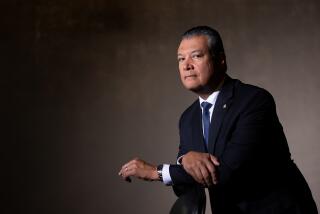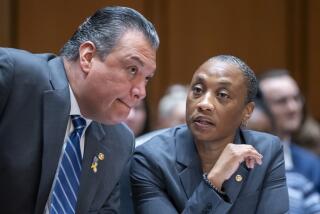Terror Suspect Indicted After 3 Years in Jail
- Share via
WASHINGTON — Jose Padilla, a U.S. citizen whose three-year detention in a Navy brig without criminal charges has been a defining legal battle in the Bush administration’s war on terrorism, has been indicted by a federal grand jury in Miami, the Justice Department said Tuesday.
In an 11-count indictment, Padilla and four codefendants were accused of operating a terrorist cell in Canada and the United States in the eight years leading up to the attacks of Sept. 11, 2001. The indictment, handed up last week and unsealed Tuesday, charges the five men with providing and conspiring to provide material support to terrorists and conspiring to murder individuals overseas. It contends that they sent money and recruits overseas with an intention to “murder, kidnap and maim.”
Padilla, 35, was born in Brooklyn and raised in Chicago, where he was arrested a number of times in gang-related crimes. As an adult, he moved to Florida, married and converted to Islam. In May 2002, as he was returning from Pakistan, the FBI arrested him at Chicago’s O’Hare International Airport; a month later, President Bush designated him an “enemy combatant” and ordered him held in military custody.
At the time, Padilla was linked by administration officials, including then-Atty. Gen. John Ashcroft, to an alleged plot to detonate a radioactive “dirty bomb” in the U.S. Officials later said he was involved in plans to blow up hotels and apartment buildings using natural gas, and that he had been trained in weapons and explosives by members of Al Qaeda.
The indictment made no reference to either alleged scheme or to any planned attacks in America, triggering questions about the earlier claims.
The charges against Padilla, long sought by his lawyers, mean he will finally get his day in court. He had become a test case of a Bush administration policy to hold certain suspected terrorists indefinitely without criminal charges or trials -- and, in some cases, without access to lawyers.
Padilla’s lawyers have fought his detention, saying that as a U.S. citizen he was being denied his right to be charged or freed. But a federal appeals court in September held that the government could continue to detain him indefinitely -- a major blow to the defense.
One of his lawyers, Donna Newman, said at a news conference Tuesday in New York that her client had denied all of the allegations and looked forward to being vindicated at trial.
“We are very happy about this indictment. It’s what we’ve asked for. You don’t hold American citizens without charges,” she said. “Now we can go to court and challenge the government’s assertions.”
She and others said the indictment amounted to a concession by the administration that there were limits to how long it could hold people in times of war.
Senior Justice Department officials, speaking on the condition of anonymity, said Tuesday that the department was not backing away from the earlier charges but that it had made a strategic decision that weighed the desire to prosecute Padilla with the need to keep certain evidence classified because of national security considerations.
The indictment also appeared to be a calculated attempt by the administration to head off the possibility of an adverse ruling in Padilla’s case from the Supreme Court, which held against the government in a similar case last year.
Padilla’s lawyers have asked the high court to review the case, and the Justice Department response is due Monday. Department officials said Tuesday that they believed the indictment would make it unlikely that the court would want to take up the matter, although Padilla’s lawyers said they would continue to press their case.
At a news conference, Atty. Gen. Alberto R. Gonzales declined to discuss why the earlier allegations against Padilla were not being brought to court, but he said the charges against him and the others were grave.
“The indictment alleges that Padilla traveled overseas to train as a terrorist with the intention of fighting a violent jihad,” Gonzales told reporters. Asked what version of events the public should believe about Padilla and his activities, he said, “I would urge the public to focus on the facts as alleged in this indictment.”
If convicted, Padilla faces a term of life imprisonment. Also indicted were Adham Amin Hassoun and Kifah Wael Jayyousi, who are being detained in Florida; Mohammed Hesham Youssef, who is in prison in Egypt; and Kassem Daher, whose legal status is unclear but who is believed to be outside the United States. Hassoun, Youssef and Jayyousi were previously charged in the case; Daher is a newly charged defendant.
Officials said Tuesday that Padilla was being moved from a military jail in South Carolina, where he has been held in solitary confinement since 2002, to a federal prison in Miami.
His lawyers requested that he be arraigned before a federal magistrate as soon as Friday but noted that, given the Thanksgiving holiday, any such appearance would probably be postponed.
“He was very happy to hear that he was going to be getting out of the brig,” said Andrew Patel, another one of his lawyers. “We will take this one step at a time.”
Because he has been indicted, his case -- at least for now -- will proceed through the federal courts, rather than a military tribunal. Justice Department officials set a tentative trial date of September 2006.
The indictment does not appear to preclude the administration from changing his status once again. Lawyers for Padilla said they were concerned that if prosecutors were unhappy at the way the criminal case was proceeding, they could again designate him an “enemy combatant” and he could end up back in the brig. To prevent that, they said, they will continue to press his case before the Supreme Court.
“There is no guarantee that the government won’t do this again, even to Mr. Padilla,” said Jenny Martinez, a Stanford University law professor who is helping represent Padilla. “I don’t think the timing is coincidental. They are clearly trying to avoid Supreme Court review.”
Legal experts and even Justice Department officials have previously acknowledged that the government was likely to face significant hurdles in bringing Padilla to trial. Much of the evidence accumulated against him during his detention has come from secret witnesses, including some senior alleged terrorist leaders in U.S. custody whom the government is not eager to allow inside a public courtroom.
While the indictment appeared to be a shell of the earlier charges against Padilla, some observers said the government might have good reasons for narrowing the case.
“There are many cases in the terrorism area where charges of material assistance or false statements are used as a way to limit the exposure of intelligence sources and classified information,” said Daniel Richman, a professor at Fordham University Law School and a former federal prosecutor.
Douglas W. Kmiec, a professor at Pepperdine University School of Law and a former Justice Department official, said the case against Padilla appeared to be “a little like putting Al Capone in jail for tax evasion: It gets him off the street and it disrupts organized crime.”
*
(BEGIN TEXT OF INFOBOX)
Allegations against an ‘enemy combatant’
A summary of Jose Padilla’s activities, according to the Justice Department and court filings:
* March 2000: Padilla joins the hajj pilgrimage to Mecca, Saudi Arabia, where he becomes interested in training in Afghanistan to become an Al Qaeda fighter.
* September-October 2000: Padilla attends the Al Qaeda- affiliated Al Farouq training camp in Afghanistan under the name Abdullah al Espani.
* Early 2002: Padilla and an unidentified accomplice approach Al Qaeda’s senior Afghan operations chief, Abu Zubeida, to propose that they travel to the U.S. and detonate a nuclear bomb they learned to make on the Internet. Zubeida suggests a plot involving a radiological “dirty bomb” instead.
* March 2002: Khalid Shaikh Mohammed, purported mastermind of the Sept. 11 attacks and Al Qaeda’s operational planner and organizer, suggests Padilla target up to three high-rise buildings that use natural gas. New York City, Florida and Washington, D.C., are discussed. Padilla is given $15,000 to carry out the attacks.
* May 8, 2002: Padilla arrives at Chicago’s O’Hare International Airport from Pakistan carrying $10,526, a cellphone, names and phone numbers of his training camp recruiter and sponsor, and e-mail addresses for other Al Qaeda operatives. He is arrested on a material witness warrant.
* June 9, 2002: Padilla is listed as an “enemy combatant” and transferred to the Defense Department.
* Dec. 4, 2002: U.S. District Judge Michael B. Mukasey rules that a federal court has authority to decide whether Padilla was properly detained as an enemy combatant.
* Dec. 18, 2003: The U.S. 2nd Circuit Court of Appeals orders Padilla to be released from military custody within 30 days and, if the government chooses, tried in civilian court.
* Jan. 22, 2004: The Circuit Court agrees to suspend its ruling after the Bush administration appeals the case to the U.S. Supreme Court.
* March 3, 2004: Lawyers for Padilla meet with him for the first time since his incarceration at a naval brig in June 2002.
* Sept. 9, 2005: A panel of the U.S. 4th Circuit Court of Appeals rules that the government can continue to hold Padilla indefinitely.
* Oct. 25: Padilla asks the Supreme Court to limit the government’s power to hold him and other U.S. terrorism suspects indefinitely and without charges. The Bush administration’s deadline for filing arguments is Nov. 28.
* Nov. 22: Padilla is indicted by a federal grand jury in Miami on charges that he conspired to “murder, kidnap and maim” people overseas.
Source: Associated Press
More to Read
Sign up for Essential California
The most important California stories and recommendations in your inbox every morning.
You may occasionally receive promotional content from the Los Angeles Times.










